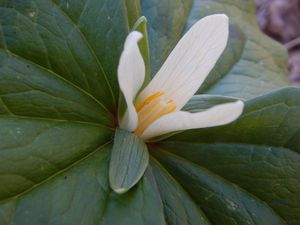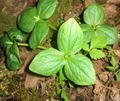Difference between revisions of "Trillium albidum ssp. parviflorum"
From Puget Prairie Plants
(→Taxonomy) |
|||
| Line 4: | Line 4: | ||
* Previous Names/Misapplications: ''Trillium'' ''parviflorum,'' ''Trillium'' ''chloropetalum.'' | * Previous Names/Misapplications: ''Trillium'' ''parviflorum,'' ''Trillium'' ''chloropetalum.'' | ||
* Codon: TRIALB | * Codon: TRIALB | ||
| − | [[File: | + | [[File:TRIALB1.jpg|thumb|Robert T. George 2016. Featured on Main Page]] |
| − | + | ||
==Taxonomy== | ==Taxonomy== | ||
{{Taxobox | {{Taxobox | ||
| Line 42: | Line 41: | ||
==Photo Gallery== | ==Photo Gallery== | ||
<gallery> | <gallery> | ||
| − | File: | + | File:TRIALB3.jpg|Photo CNLM |
File:TRIALB2.jpg|Photo Rod Gilbert 2003 | File:TRIALB2.jpg|Photo Rod Gilbert 2003 | ||
File:TRIALB4.jpg| Young growth Photo CNLM | File:TRIALB4.jpg| Young growth Photo CNLM | ||
Revision as of 21:07, 18 March 2021
- Scientific Name: Trillium albidum ssp. parviflorum
- Family: Melanthiaceae
- Common Names: small-flowered trillium, small-flowered wakerobin
- Previous Names/Misapplications: Trillium parviflorum, Trillium chloropetalum.
- Codon: TRIALB
Contents
Taxonomy
| Trillium albidum ssp. parviflorum | |
|---|---|
| Scientific classification | |
| Kingdom: | Plantae |
| Subkingdom: | Viridiplantae |
| Phylum: | Tracheophyta |
| Subphylum: | Spermatophytina |
| Class: | Magnoliopsida |
| Subclass: | Lilianeae |
| Order: | Liliales |
| Family: | Melanthiaceae |
| Genus: | Trillium L. |
| Species: | Trillium albidum J.D. Freeman |
| Subspecies: | Triodanis albidum ssp. parviflorum V.G. Soukup |
Description
Perennial herbs bearing solitary, sessile flowers subtended by a whorl of 3 leaves. Sepals 3, distinct or nearly so and persistent, petals 3, white to creamy white, occasionally pink to purple-tinged at base. Ovary superior, 3-celled; stigmas 3. Stamens 6. Leaves sessile, obscurely mottled. Fruit a many-seeded, berrylike capsule.[2]
Bloom Period
March-May
Distribution
West Cascades, Pierce County, WA, South to northern Willamette Valley.
Habitat
Moist lowland forests, Oak-ash woodlands, thickets.
Propagation
Grows readily from seed in gardens.[2]
Photo Gallery
References
- ↑ Integrated Taxonomic Information System. Retrieved from https://www.itis.gov/servlet/SingleRpt/SingleRpt?search_topic=TSN&search_value=505593#null
- ↑ 2.0 2.1 Hitchcock, C. L., Cronquist, A., Giblin, D., & Legler, B. et al. (2018). Flora of the Pacific Northwest: an illustrated manual. Seattle: University of Washington Press





